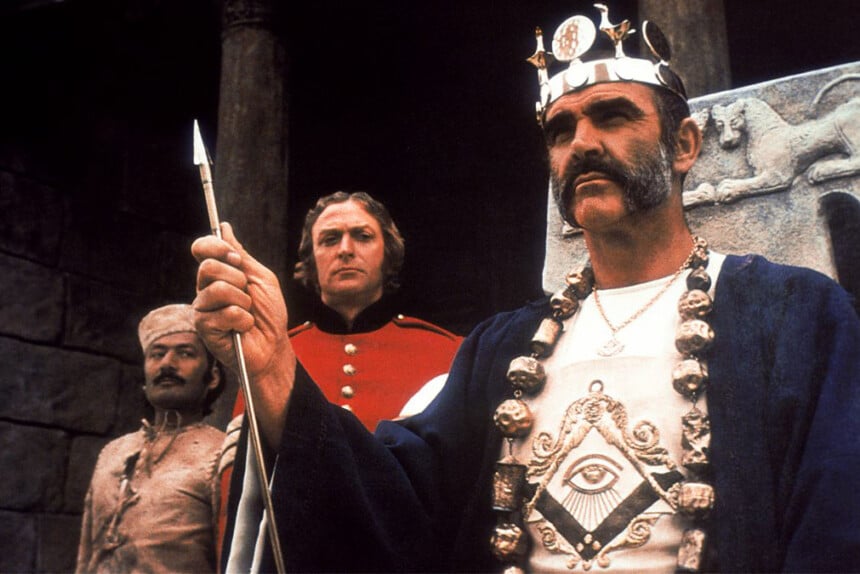The Man Who Would Be King
Written and Directed by John Huston ◆ Produced by John Foreman ◆ Distributed by Columbia Pictures
With Afghanistan on the mind, as President Biden tries to benightedly disengage from America’s longest war, it seems a worthy time to revisit John Huston’s 1975 adaptation of Rudyard Kipling’s The Man Who Would Be King. The story’s Afghanistan setting both on the page and screen provides a perfect instance of the perfidy England could at times practice with respect to its third world subjects.
Originally written in 1888 while Kipling was a British journalist in India, the tale is a criticism of the British empire’s colonial policy in the subcontinent. Although Kipling is known for having supported colonialism when it was carried out honorably, he was its blistering critic when it wasn’t. It was his conviction that the British had a moral duty to improve the lives of those they ruled. Where they instead took advantage of native peoples, it was an abomination.
This couldn’t be more apparent than his commendation of darker peoples with the adjective “white.” His poem Gunga Din provides a perfect example of this now-forbidden attitude. We only have to recall the lines in which he honors an Indian water carrier for his service under fire: “An’ for all ’is dirty ’ide / ’E was white, clear white, inside / When ’e went to tend the wounded under fire!”
Kipling’s story, The Man Who Would Be King, provides another example of this. In the time that the story takes place, Afghans, though dark metaphorically in their political attitudes, were white in complexion, a feature that is repeatedly mentioned in the narrative. The morally dark people in the story are his principle characters, Daniel Dravot and Peachey Carnehan, British soldiers whose shady doings put them on the wrong side of the moral color line. These amoral rascals resigned from their army commissions in order to take material advantage of the local people they find in India and Afghanistan.
Huston’s film hews quite closely to the text. The hustlers, played by Michael Caine and Sean Connery, are first presented with a good deal of humor, then increasingly with withering disapproval. Huston had originally proposed the parts to Paul Newman and Robert Redford until Newman reminded him that Dravot and Carnehan are thoroughly British. Perhaps Huston had been thinking commercially, after all; Newman and Redford had won some success in 1969 playing two other rascals in George Roy Hill’s Butch Cassidy and the Sundance Kid. But whatever the actors’ charm, it was unlikely to work in a film centered on two Englishmen who had been playing roles as members of Her Majesty’s secret service. You could say without exaggeration that Newman saved Huston from a grave misstep.
The story begins with Carnehan pickpocketing a watch from Kipling himself, who is played quite convincingly by Christopher Plummer. Their larger intention is to travel into Afghanistan and help themselves to the loot gathered by the country’s perpetually warring tribes.
Their plan is simple, or seems so. They have the weapons and military discipline to bring the primitives to heel. Things go well at first, but then the populace comes to view Dravot as a god and descendant of Alexander the Great when he survives an arrow wound in his chest.
One would think this a propitious turn of events but it turns out otherwise, for Dravot begins to believe his own press, so to speak. He feels obligated to his subjects and wants to improve their lot, which, to Carnehan’s dismay, he does at first. From there things move inexorably toward disaster.
Dravot embraces his newfound eminence and envisions himself welcoming Queen Victoria to her latest acquisition. In one of the funniest moments in the film, he tells Carnehan to address him as a divinity, hastening to add that this is not because he believes himself to be supernatural; it’s only a ploy to keep his subjects in line.
It soon becomes clear that Dravot has taken to more than half believing in his own divinity. Of course, whether king or god he’ll have to have heirs, so he’ll have to marry in order to inaugurate a dynasty. For his wife, he chooses the most attractive of the tribe, who is played by Shakira Caine, Michael Caine’s Guyanese wife.
The story unfolds as a comic version of Joseph Conrad’s Heart of Darkness, with the horror of that tale leavened by the comedy of Dravot’s ludicrous ascended
warlord deity.
Image Credit:
above: Michael Caine and Sean Connery in The Man Who Would Be King (1975, Columbia Pictures)

Leave a Reply